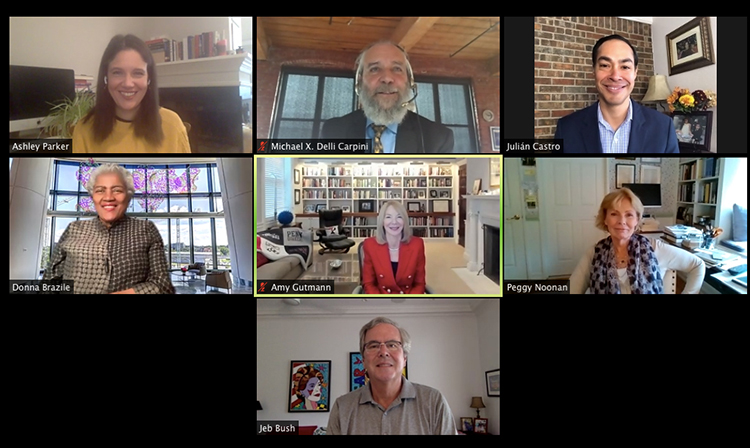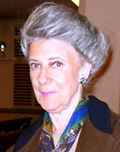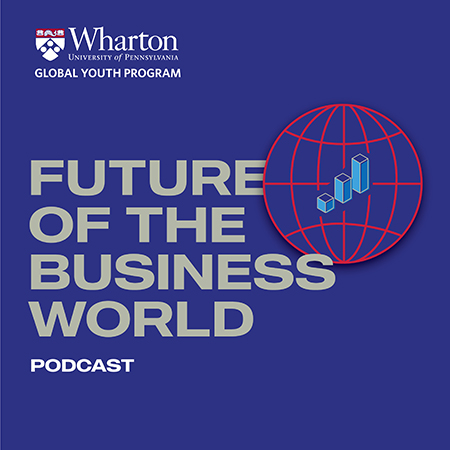Silfen Forum: Civil Discourse in Uncivil Times

At the 2020 Silfen Forum, hosted by President Amy Gutmann, students, faculty, staff, and alumni tuned in to hear from a group of distinguished experts—Ashley Parker, Julián Castro, Donna Brazile, Peggy Noonan, and Jeb Bush, with Michael Delli Carpini of the Paideia Program serving as the event’s moderator. This year’s Forum was co-sponsored by Penn’s SNF Paideia Program.
“Our politics is a mirror of our culture,” said former Florida Governor Jeb Bush last Tuesday, during Penn’s 11th David and Lyn Silfen University Forum, which had a theme this year of “Civil Discourse in Uncivil Times.”
Governor Bush, who has also served as a Presidential Practice Professor at Penn, was joined on Zoom by Donna Brazile, a political strategist, author, and Fox News contributor; Julián Castro, the 16th U.S. Secretary of Housing and Urban Development and former mayor of San Antonio, Texas; Peggy Noonan, an author, The Wall Street Journal columnist, NBC News and ABC News contributor, and a 2018 Penn honorary degree recipient (Almanac February 6, 2018); and Ashley Parker, a Pulitzer-prize winning White House reporter for The Washington Post, senior political analyst for MSNBC, and a Penn alumna (C’05).
“The best way to preach civility is to practice it,” said Ms. Brazile.
“Read conservative publications and liberal publications, watch Fox News and MSNBC. Then you can make your own decisions, but you’ll be best informed,” said Ms. Parker.
The hour-and-a-half long event, which brought together what President Gutmann called a “blue-ribbon panel” of experts, was originally slated for this past spring, but was moved to this semester and to a live, online format due to COVID-19. More than 1,000 people tuned into the event. It can be viewed at https://silfenforum.upenn.edu/webcast
In the midst of a historic presidential election, a worldwide pandemic, and the largest mass movement for racial justice in generations, the conversation, which encouraged listeners to reach across divides, came at a pivotal time.
“With 20 days to go before a presidential election, political scientists are documenting hyper-partisan divides, demonization of political opponents, and rampant misinformation gone viral over social media, even about basic matters of life and death,” said President Gutmann, as she opened the Forum. “But these phenomena are not new to 2020. It’s well documented that we tend to listen to like-minded media, we tend to shut out facts that challenge our own beliefs. … It takes hard work to counter these tendencies.”
President Gutmann, who closed out the Forum by summing up its key components, explained how the panelists had “laid out the stakes” and how “it’s up to us to take their advice to heart, to mind, and to action.
“This is an opportunity to keep the conversation going,” she said.
Monument Lab: $4 Million Grant from Andrew W. Mellon Foundation
The Andrew W. Mellon Foundation Grant, entitled Beyond the Pedestal: Tracing and Transforming America’s Monuments, will support the production of a definitive audit of the nation’s monuments; the opening of ten Monument Lab field research offices through $1 million of subgrants in 2021; and capacity for Monument Lab to hire its first full-time staff and develop significant art and justice initiatives.
The grant is the first from a new $250 million “Monuments Project” from the Mellon Foundation created “to transform the way our country’s histories are told in public spaces.”
“We are proud to launch our new Monuments Project with our first partner, Monument Lab, and to support their work to more deeply learn and vibrantly reimagine our public spaces to better reflect the rich multiplicity of American stories,” said Elizabeth Alexander, president of The Andrew W. Mellon Foundation. “Through Beyond the Pedestal, Monument Lab will generate critical, comprehensive research to understand the commemorative landscape as it is, and to seed what it could become. We are energized about the transformative possibility of their work.”
“Over the last decade, we have worked around the country with artists, educators, and public institutions who have been transforming the monument landscape,” said Paul Farber, director of Monument Lab. “Thanks to this grant and meaningful relationship with the Mellon Foundation, we will expand our work making generational change in the ways art and history live in public.” Monument Lab was founded by Dr. Farber and Ken Lum.
The first project supported by the grant is the National Monument Audit, which will assess the current monument landscape across the United States. The National Monument Audit draws on existing data on monuments from national, state, municipal, and publicly created sources. The Audit will contextualize the monuments within specific geographies and communities and create a concurrent dataset of reported protest activities tied to monuments.
The National Monument Audit will lead into a larger 2021 initiative that will subgrant a total of $1 million to create ten new Monument Lab field offices that will re-imagine monuments in cities, regions, and communities across the country.
Related: New Penn Initiative to Preserve African American Civil Rights Heritage Sites
For the health and safety of the community, the University of Pennsylvania is committed to maintaining a drug-free workplace. Drug and alcohol abuse endangers individual users, as well as their family, friends, and coworkers. The use of any substance that impairs your workplace judgement or abilities puts you, your colleagues, and Penn students at risk—especially in a pandemic environment.
Please take the time to review the University’s drug and alcohol policies.
Penn’s Drug and Alcohol Policies
Penn prohibits the unlawful manufacture, distribution, dispensation, sale, possession or use of any drug by its employees in its workplace. Complete policy details are available online:
Understanding Addiction
Addiction is a serious disease, but many effective treatments are available. Visit Penn’s Health Advocate website at http://www.healthadvocate.com/upenn for facts about addiction, recovery, and support services for faculty and staff.
Help Is Here
If you or a family member has a substance abuse problem, we encourage you to seek help. Penn provides free, confidential counseling services for you and your immediate family members through the Employee Assistance Program (EAP). The EAP will assist you with challenges that may interfere with your personal or professional life, including substance abuse.
For more information about the EAP’s counseling and referral services, visit the Employee Assistance Program web page at https://www.hr.upenn.edu/eap or contact the Employee Assistance Program 24 hours a day, 7 days a week at (866) 799-2329.
You can also refer to Penn’s addiction treatment publication for information about treatment benefits and resources at https://www.hr.upenn.edu/docs/default-source/benefits/opioid-brochure.pdf.
2019-2020 Report of The Office of The Ombuds
The past year brought many challenges to the Penn community and to the Office of the Ombuds. Engagement with the issues of racial and socioeconomic injustices has increased on campus, as well as throughout the country, raising difficult questions about priorities and actions. When the evolving public health crisis led the University in March to suspend most on-campus activities and to shift many of them online, faculty, students, and staff had to adapt quickly. The Office of the Ombuds experienced these same stressful events and similarly made several adjustments. Though we prefer to meet face to face with our visitors, we quickly transitioned to virtual meetings. That adaptation went smoothly, and the Office is well positioned to continue to operate remotely until it is safe to return to 113 Duhring Wing.
In these stressful times, the Office of the Ombuds offers a safe, confidential space where all members of the Penn community can bring concerns and questions. The Office works with visitors to clarify problems and decide what additional steps, if any, to take. The Ombuds Office team does not take sides in disputes. Rather, we remain neutral. The Office of the Ombuds is structurally independent from all of Penn’s schools and administrative offices other than the President’s Center, which provides the office with its budget but otherwise is not involved with its work with visitors. Our aim is to deescalate tension and to resolve problems informally. Although we do not carry out investigations, we can make additional inquiries if needed. The Office cannot impose a particular resolution of a problem, but it can, and does, advocate for fairness and consistency. When patterns of problematic actions are observed, we bring these to the attention of appropriate University administrators.
During the academic year, 2019-2020, 187 individuals consulted the Ombuds Office. On a campus where nearly 47,000 people regularly study, teach, conduct research, and work, this is a small number. Nevertheless, it signals dissatisfactions that need to be faced and addressed. The number of visitors to the Ombuds Office during the past academic year represents an 8.7% increase from 2018-2019. University staff accounted for the largest proportion of visitors (45%), followed by faculty (24%), graduate and professional students (16%), undergraduate students (9%), post-doctorates (3%), and others (4%). See Table 1. Visitors to the Office come from all parts of the Penn community. These proportions have remained roughly stable for the last several years with only slight annual variations in their distribution. They reflect the relative sizes of these categories in the total population of the University, as well as the availability of alternative support services for particular groups and Penn community members.
Table 1: Visitors By Affiliation 2019-2020
| Faculty |
24% |
45 |
| Graduate/Professional |
16% |
29 |
| Undergraduate |
9% |
17 |
| Staff |
45% |
84 |
| Post-Doctorates |
3% |
5 |
| Other |
4% |
7 |
| Total |
|
187 |
The Office of the Ombuds records the nature of issues brought forward, using a few broad categories, which remain constant to facilitate comparisons over time. More recently, we have also utilized the classification system developed by the International Ombudsman Association, in order capture a more detailed picture of the issues raised. The largest number of visitors have concerns relating to their jobs at Penn (42%), while other visitors reported problems with an academic matter (19%) or made complaints about the behavior of others (28%). See Table 2.
A few patterns stand out. Accoounts of what is perceived as inappropriate or abusive behavior continue to be reported. The behaviors cited include micro-aggressions, discrimination, sexual harassment and, more broadly, conduct seen as threatening or bullying. Many individuals report feeling disrespected or coerced by those with whom they work, particularly when there is a power disparity. These incidents are often exacerbated by cultural or language differences. Performance reviews and office reorganizations also trigger conflict. While differences of opinion are inevitable, their impact can be intensified by a lack of transparency and by poor communication skills.
Table 2: Visitors By Issues Raised 2019-2020
| Academic-Related |
19% |
35 |
| Employment-Related |
42% |
79 |
| Behavior |
28% |
52 |
| Other |
11% |
21 |
| Total |
|
187 |
The absence of formal, well-publicized procedures outlining responsibilities sometimes hampers the ability of faculty, staff, and students to resolve disputes. Disagreements with academic advisors, progress toward a degree, or control of data intensify if expectations remain unwritten and open to dispute. Faculty and graduate students have raised questions about the ownership of intellectual property, many of which could have been resolved if departments, programs, and laboratories had written protocols in place. During this past year, we have continued to recommend the wide circulation of the pamphlet, “Advising and Mentoring Ph.D. Students,” published by the Office of the Vice Provost for Education. It can help departments and programs develop their own written procedures in line with University guidelines.
It should not come as a surprise that the pandemic’s dramatic disruptions brought many visitors to the Office of the Ombuds. Soon after the transition to remote work for “non-essential” employees, concerns were raised regarding changed office procedures, the definition of “essential,” and fears about disease transmission on campus. Faculty worried about the impact of the virus on research agendas, their tenure clocks, and reappointment procedures. Students were troubled by their lack of access to housing and the difficulties posed by online learning. The national movement against racial injustice has also influenced the work of the Ombuds Office. In the wake of the killing of George Floyd and the energizing of the Black Lives Matter movement, we have found an increase in the number of visitors with concerns about racism and bias, both conscious and unconscious.
When members of the Penn community bring problems to the Office of the Ombuds, we work to understand their frustrations and the circumstances surrounding their complaints. These discussions are confidential. We help visitors to define their priorities and, together, we explore options for resolution of the issues raised. No additional actions are taken without a visitor’s permission. Table 4 lists the services offered by the Office as well as the frequency with which that form of assistance was provided. The Ombuds Office supplies information about relevant University policies that may be pertinent to a visitor’s concerns and may collect additional information. Visitors are often directed to other resources and offices on or off campus. When it is useful, visitors are coached about how to present their concerns to a supervisor or advisor in a manner that is most likely to result in constructive discussion and the resolution of their concerns. The Ombuds Office can facilitate meetings among parties to a dispute and also provides mediation services. These services are available both to individuals and to groups who come to discuss a collective problem.
The Ombuds Office, located at 113 Duhring Wing, is currently closed. We can be reached by phone at (215) 898-8261 or online at www.upenn.edu/ombuds/. Please consult the website for more information about the Office and its activities or to arrange a consultation. We respond to inquiries quickly, and we encourage anyone experiencing difficulties related to their work, academics, or any other aspect of life as a member of the Penn community to contact the Ombuds Office. Visitors may speak with us without providing names or identifying information if they so choose.
On June 30, Lynn Hollen Lees, professor of history emerita, completed her term as Ombuds, and Jennifer Pinto-Martin, Viola MacInnes/Independence Professor of Nursing in the School of Nursing and professor of epidemiology in the Perelman School of Medicine, was appointed to that position. Fortunately, Marcia Martinez-Helfman continues in her role as Associate Ombuds, providing continuity, wise counsel, and professional expertise.


Annual Selection Period for Retirees and Long-Term Disability Recipients: October 26-November 20
The Annual Selection Period for retirees and Long-Term Disability recipients will run from Monday, October 26 to Friday, November 20, 2020. This year, Penn has extended the selection period to four weeks. This annual event allows participants to review their current benefits and make changes for the upcoming calendar year. All changes will be effective as of January 1, 2021.
Personalized enrollment packets will be mailed to each participant’s home shortly. You’ll receive a 2021 Annual Selection Guide, which includes current enrollment information and costs, medical plan comparison charts, what’s new for 2021, and more. Visit the Human Resources website at www.hr.upenn.edu/retirees for complete details.
Pandemic health and safety precautions prevent Penn from holding on-campus information sessions and benefits fairs as we have done in prior years. We encourage you to visit www.hr.upenn.edu/retirees for addition Retiree Annual Selection information.
How to Enroll or Make Changes to Your Benefits
There are two ways to enroll or make changes to your benefits for the 2021 Annual Selection period. You can call the University of Pennsylvania Benefits Solution Center at Health Advocate at (866) 799-2329, or use the Workday@Penn enrollment system and complete the following steps online:
- With your PennKey and password log in to Workday at www.myworkday.com/upenn/login.html.
- From your home page, select the Inbox icon in the upper right corner or click “Go to Inbox.”
- Select “Open Enrollment—Event” in your inbox.
- Click “Elect” or “Waive” next to the corresponding benefit plan (your current coverage will be displayed for each benefits election).
- When you have completed all of your elections, click “Submit.”
All elections or changes must be made by Friday, November 20, 2020 at 5 p.m. ET.
If you have questions about this year’s Annual Selection Period, please contact the University of Pennsylvania Benefits Solution Center at Health Advocate at (866) 799-2329, Monday-Friday, 8 a.m.-10 p.m., ET.
—Division of Human Resources




.jpg) Catherine (Kaki) Hurley Marshall, former assistant managing director of the Annenberg Center, founder of the International Children’s Festival, and Theatre Arts Program lecturer, died August 29 in Strathmere, New Jersey. She was 94.
Catherine (Kaki) Hurley Marshall, former assistant managing director of the Annenberg Center, founder of the International Children’s Festival, and Theatre Arts Program lecturer, died August 29 in Strathmere, New Jersey. She was 94. Ione Apfelbaum Strauss (CW’54, PAR’82), former University of Pennsylvania trustee, died October 1 of heart failure at her home in Haverford. She was 87.
Ione Apfelbaum Strauss (CW’54, PAR’82), former University of Pennsylvania trustee, died October 1 of heart failure at her home in Haverford. She was 87. The built environment—our streets, public spaces, and monuments—has played a critical role in our country’s ability to confront and understand the history and issues relating to civil rights in the United States.
The built environment—our streets, public spaces, and monuments—has played a critical role in our country’s ability to confront and understand the history and issues relating to civil rights in the United States.


